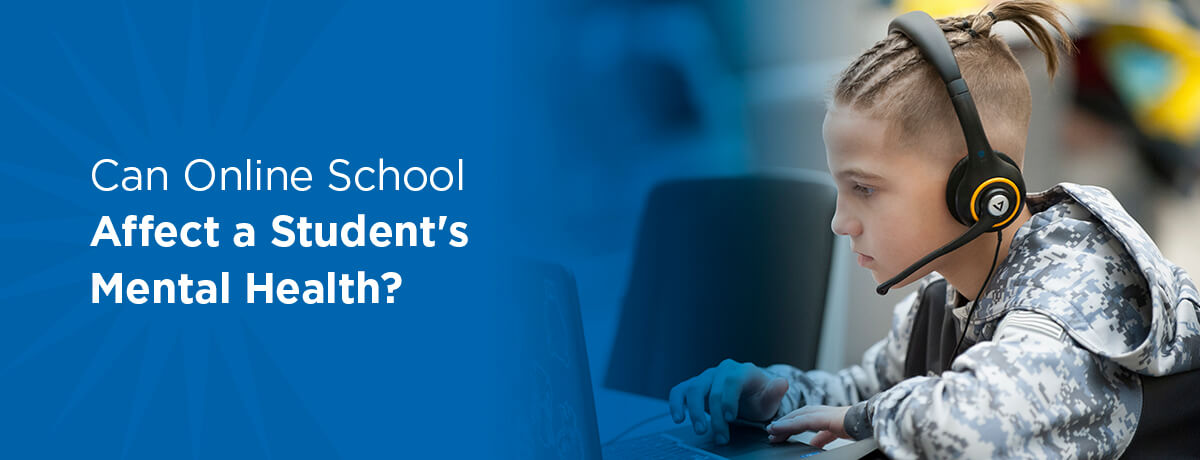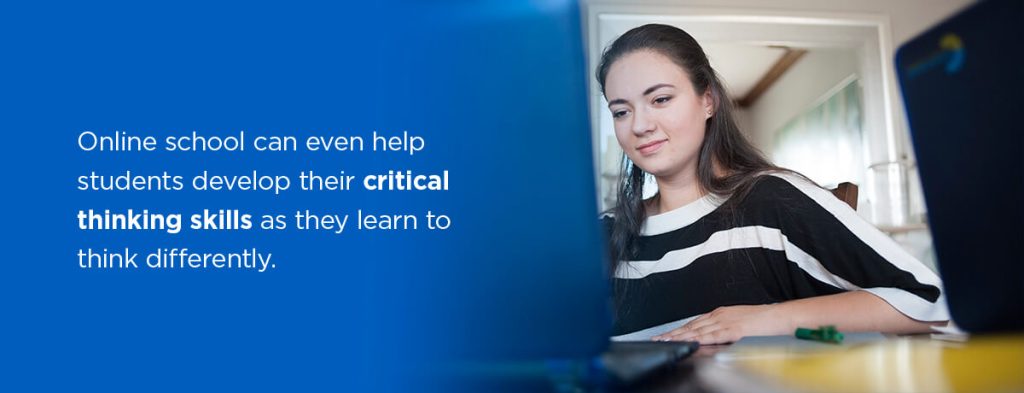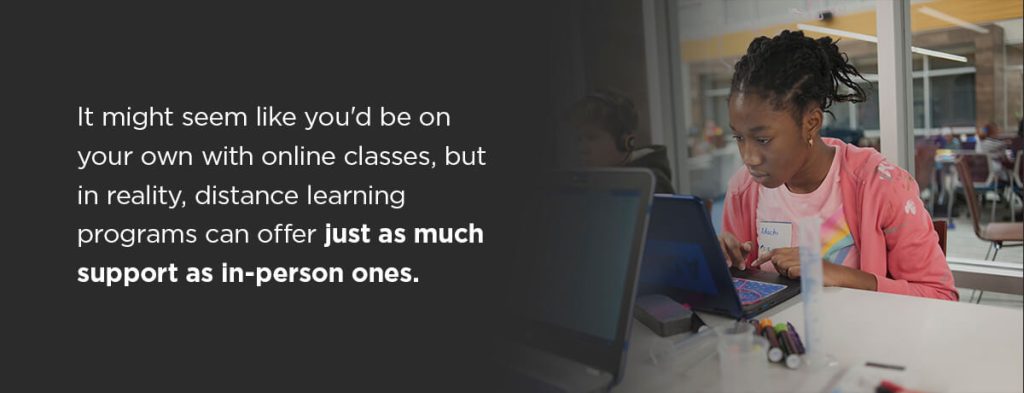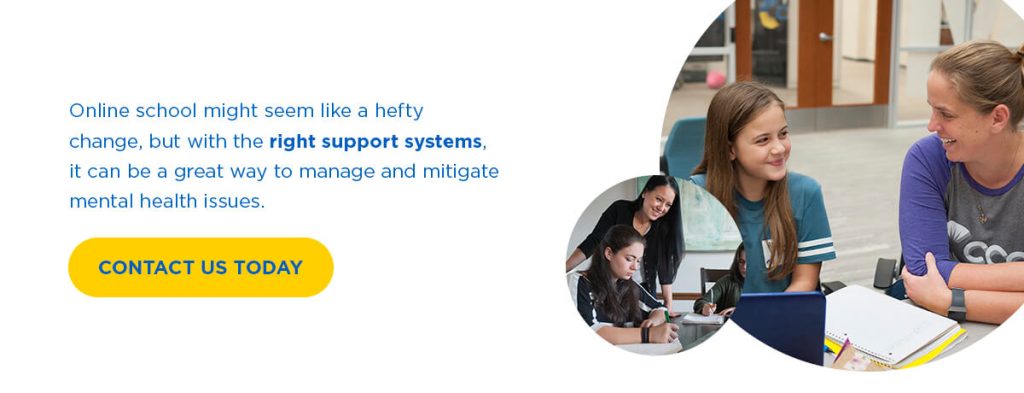2025-2026 School Year Enrollment Now Open. Click Here
2025-2026 School Year Enrollment Now Open. Click Here

“Grades, friends, hobbies, college prep, extracurricular activities — students have a lot to contend with, and each element can affect their mental health. With issues like depression and anxiety on the rise, it’s worth considering the role a student’s education might play in their mental health. Many of us are familiar with the struggles of in-person school, but what about distance learning? While it’s true that online school can pose a few mental health challenges for students, it also offers several advantages, like reduced contact with bullies and personalization for a student’s needs. With the right program, online learning can actually alleviate some mental health problems for students and cultivate a low-stress educational environment. Let’s explore the psychological effects of online learning and how school affects mental health.
Mental health is complex. Mental health conditions originate from many causes and have wide-reaching effects that ripple into other areas of someone’s life, such as their academic achievement, physical health, and relationships. For example, mental illness might cause a student to have trouble focusing, isolate themselves, lose interest in school, lose their optimism, or feel fatigued. And of course, they’ll feel consistent negative emotions too, like sadness and nervousness. The numbers tell us just how serious student mental health can be. School-aged children with mental, emotional, or behavioral concerns were three times more likely to repeat a grade, and high schoolers with significant depression symptoms were more than twice as likely to drop out as their peers. They may struggle to concentrate on schoolwork or find the motivation to finish it. Outside of education, poor mental health can cause problems for a student’s quality of life, physical health, and relationships. It’s even associated with increased long-term risks for chronic diseases, substance misuse, suspension or expulsion, future job satisfaction, and absenteeism. But it isn’t all scary — one study showed that, despite worsening mental health, students reported an increase in supporting each other in mental wellness. Many of them said they received resources from their schools and that they know where to go if they need help. What kinds of mental illnesses are students dealing with? The most commonly diagnosed mental disorders include attention-deficit/hyperactivity disorder (ADHD), anxiety, behavioral disorders, and depression:
Children can hide their symptoms, too, so it isn’t always obvious if a child is facing one of these disorders. These conditions may start with a trigger, such as pressure from school or the loss of a significant relationship. Genetic components are also involved in some of these disorders, so if you have a family history of one, your child may be more likely to have it. Even without a diagnosed disorder, students will face mental health challenges from time to time. A difficult class could cause a bout of anxiety, while a fight with a friend might bring some sadness into their life. Managing persistent mental health issues can be difficult, and self-care is essential. One way that many families manage mental health issues is by enrolling their kids in online school.

For many children facing issues with mental health, online learning can alleviate symptoms and allow them to complete schoolwork without their mental health issues getting in the way. Online school is just as rigorous as in-person school, but it offers more flexibility and an environment that can be personalized to the student’s needs. It also helps them hone various new skills that can help with managing mental health. Below are some ways that online school can affect a student’s mental health for the better.
For students with social anxiety, distance learning can alleviate some of the scariest parts of the school day. Online learning gives them complete control over who they interact with and when. Kids get plenty of social opportunities, but they don’t need to be trapped in situations that cause stress and anxiety.
A common trigger for mental health issues is stressful school environments. The right online learning program can allow you to personalize your student’s experiences to their unique needs. Your child might be able to take more classes that interest them or adjust their schedule to include more breaks. This unique feature of online school allows learners to make adjustments to keep feelings of stress, anxiety, and depression at bay. Personalization is also a great way to tailor learning for students with attention or behavioral problems. A student with ADHD might have trouble paying attention for hours on end. Instead of sticking to a regimented in-person schedule, they could split the day up into smaller chunks. They can take more breaks and blow off steam between classes.
Many students experience stress from the sheer demand of traditional schooling and extracurricular activities. They may not have time to attend all the events they want or get their work done. Online school is flexible, so students can take their courses when it works for them. They can work around events, clubs, sports, and medical appointments and learn to manage their time effectively. Traditional students often don’t learn time management skills until they enter college, so this experience can give your student a head start.
Another excellent skill your student will learn in an online program is virtual communication. In today’s world, communicating with others on virtual media is an essential skill and not one that everyone learns. Just because someone knows how to send an email doesn’t mean they know how to craft it to get their message and tone across or identify when a message needs to be given over video instead. They may not know the intricacies or etiquette of video calls, either. Distance learning teaches these skills alongside the curriculum. Students graduate knowing how to communicate and collaborate with others digitally — a vital ability for today’s modern workforce.
Similarly, online students gain proficiency in various digital tools. They might type at the speed of light, learn to troubleshoot issues, or adapt to new platforms with ease. From specialized software knowledge to general digital awareness, they become technical gurus with the know-how required for effectively using the platforms they’ll need for their personal and professional lives. All of those skills look great on college or job applications, too.

Online school can even help students develop their critical thinking skills as they learn to think differently. Online classes are somewhat unique, and they ask students to consider new situations and strategies as they learn. Learners might explore topics like pacing themselves, prioritizing certain tasks over others, and generally thinking in new ways.
Here’s another skill many students don’t learn until they’re well into college. Traditional school is highly regimented, with strict schedules and requirements. Students are told what to do and when, so there isn’t much room for developing their own schedules. The flexible, personalized environment of online school tends to be more rewarding, but it also requires students to motivate themselves to get their work done. Outside pressure is less obvious, so they learn a lot about what it takes to have a fulfilling education.
The personalized, flexible setting of an online program is an excellent resource for minimizing the stress and anxiety of the school day. Students can make their schedule fit their needs. For example, a student who knows they prefer asynchronous courses can enroll in those classes, receiving a more enjoyable experience that fits their learning method. Online schools can also help students reduce stress and anxiety through connections with their peers and a support system in the school. They can enjoy some plain old fun with their classmates and turn to faculty and parents for support.
As with in-person school, you can find programs with a wealth of resources for students to use if they’re facing mental health issues, like school counseling and accommodations. Online school can even allow students to cut out the middleman and go straight to the source for faster resolutions. At CCA, for instance, the Student Assistance Program (SAP) can step in to connect families with the right resources.
No solution is without pros and cons. Online learning is associated with a few drawbacks, but the right school should make efforts to alleviate these problems. Here at CCA, for example, we have robust support systems in place to counteract the following cons typically associated with distance learning.
Social isolation is a big concern — the Centers for Disease Control and Prevention (CDC) even considers it a serious public health risk, as it’s associated with increased risk for severe medical conditions like dementia. It can cause mental health issues and reduce a student’s opportunities for honing their communication skills. Many kids in traditional schools are overwhelmed with the amount of social activity they get, but online classes tend to be a little quieter. For many, this is a positive, but it also raises the question of whether students are getting enough interaction with their peers. At CCA, we make sure students get plenty of socialization through digital and in-person means. Digitally, they learn to use new forms of communication to collaborate and learn with their peers. From group work in class to clubs that match their interests, students can make friends through various digital platforms. We also offer a range of in-person socialization opportunities. We hold over 500 field trips with exciting hands-on activities, and our Family Service Centers host various events like game nights and workshops. Many clubs hold in-person meetings at these centers, as well.
Some see the need for self-motivation as a drawback, but we see it as a learning opportunity. Online school does require some self-motivation and time management, but those are qualities students will need when they leave school. By learning these skills early, learners can be better prepared for the demands of college and work. Where their classmates might struggle, a student from an online school can stay organized and accomplished. At CCA, we understand the challenge posed by this kind of learning, which is why we help students build the skills early on. Our attentive staff and family mentors are ready to help kids learn all about managing their time and mastering the demands of online classes.
Online schooling might also seem like it requires sitting in one place for long periods, but then again, so does in-person school. Online classes actually have the advantage here because of asynchronous options, meaning students don’t need to log in at any specific time to do their work. In other words, the program is self-paced. Students can get up and move or take breaks if needed. They can get the wiggles out or take a beat and relax. CCA offers both synchronous and asynchronous learning options so students can choose what kind of classes meet their needs.

It might seem like you’d be on your own with online classes, but in reality, distance learning programs can offer just as much support as in-person ones. You just need to find the right school. Here at CCA, we have support systems to help students with everything from mental health problems to college readiness and socialization. Students can get support from teachers, counselors, family mentors, the SAP, and many other places in CCA. Our goal is to improve the student experience regardless of the online format.
Our online setup doesn’t stop us from helping students manage their mental health and cultivate an enjoyable educational environment. We pride ourselves on personalized learning that allows students to stay uplifted and engaged by attending classes that meet their needs. Whether your student is having trouble paying attention due to depression or ADHD or they struggle with social anxiety, the understanding team at CCA can help you find solutions. We’re here to help kids of all ages succeed with customized learning plans and access to many forms of assistance. Families can rest assured that CCA puts student well-being first.

Online school might seem like a hefty change, but with the right support systems, it can be a great way to manage and mitigate mental health issues. CCA has all the necessary support to keep students happy and healthy in their educational journey. If you have any questions about our learning programs or would like more information on how to enroll your child, reach out to us today!”
2025-2026 School Year Enrollment Now Open. Click Here